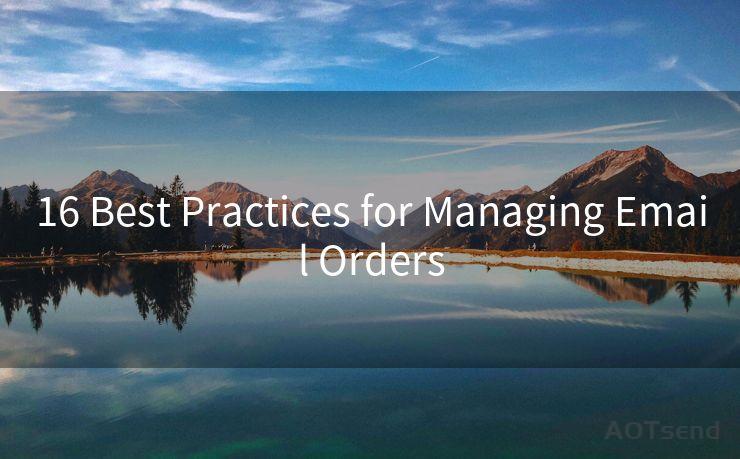16 Best Practices for Managing Email Orders




In the age of digital communication, email has become a critical tool for businesses to manage orders and communicate with customers. To streamline this process and ensure customer satisfaction, it's essential to follow best practices for managing email orders. Here are 16 key practices that can help you efficiently handle email orders and boost your business operations.

1. Set Up a Dedicated Email for Orders
Having a separate email address specifically for order-related inquiries helps organize your communication and makes it easier to track and respond to customer requests.
2. Use Automated Responses
Set up automated responses to confirm receipt of orders and provide customers with an estimated response or resolution time. This ensures customers know their request has been received and is being processed.
3. Create a Standard Operating Procedure (SOP)
Develop a clear SOP for handling email orders, including steps for verifying order details, processing payments, and arranging shipments.
4. Prioritize Emails
Use email filters or tags to prioritize order emails based on urgency. This helps your team address the most critical orders first.
5. Maintain a Knowledge Base
Build a knowledge base with FAQs and solutions to common order-related issues. This reduces response time by allowing customers to self-serve and your team to quickly find answers.
6. Train Your Team
Regularly train your customer service team on the SOP, email etiquette, and product knowledge to ensure they can efficiently and accurately respond to order inquiries.
7. Use Templates for Common Responses
Create email templates for frequently asked questions or issues to speed up response times and ensure consistency in messaging.
8. Follow Up Regularly
Implement a system for regular follow-ups, especially for orders that require additional information or action from the customer.
9. Monitor Key Performance Indicators (KPIs)
Track KPIs like response time, resolution rate, and customer satisfaction to measure and improve your email order management process.
10. Ensure Data Security
Follow strict data security measures when handling customer information received via email, such as encrypting sensitive data and using secure servers.
11. Integrate with CRM or Order Management System
Integrate your email system with your Customer Relationship Management (CRM) or Order Management System to streamline data entry and order processing.
12. Provide Multiple Channels for Support
Offer additional support channels like live chat or phone support for customers who prefer not to use email.
13. Be Transparent About Delays
If there are any delays in processing an order, inform the customer promptly and provide regular updates.
14. Encourage Feedback
Invite customers to provide feedback on their experience, and use this feedback to improve your email order management process.
15. Use Professional Language
Maintain a professional tone in all email communications, avoiding slang or informal language.
16. Regularly Audit Your Process
🔔🔔🔔
【AOTsend Email API】:AOTsend is a Managed Email Service for sending transactional emails. Support Email Types: reminders, authentication, confirmations, notifications, verification codes, invoices, password resets, account activations, billing statements, two-factor authentication (2FA), and one-time passwords (OTP) emails, etc. $0.28 per 1000 Emails. 99% Delivery, 98% Inbox Rate.
You might be interested in:
Why did we start the AOTsend project, Brand Story?
What is a Managed Email API, How it Works?
Best 25+ Email Marketing Platforms (Authority,Keywords&Traffic Comparison)
Best 24+ Email Marketing Service (Price, Pros&Cons Comparison)
Email APIs vs SMTP: How they Works, Any Difference?
Periodically review and audit your email order management process to identify bottlenecks or areas for improvement.
By following these 16 best practices for managing email orders, you can enhance customer satisfaction, improve operational efficiency, and grow your business. Remember, effective communication and a streamlined process are key to building trust and loyalty with your customers.




Scan the QR code to access on your mobile device.
Copyright notice: This article is published by AotSend. Reproduction requires attribution.
Article Link:https://www.mailwot.com/p506.html



